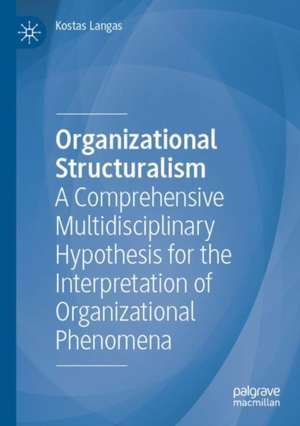Organizational Structuralism: A Comprehensive Multidisciplinary Hypothesis for the Interpretation of Organizational Phenomena
Autor Kostas Langasen Limba Engleză Paperback – 2 dec 2023
| Toate formatele și edițiile | Preț | Express |
|---|---|---|
| Paperback (1) | 1126.65 lei 6-8 săpt. | |
| Springer International Publishing – 2 dec 2023 | 1126.65 lei 6-8 săpt. | |
| Hardback (1) | 1131.22 lei 6-8 săpt. | |
| Springer International Publishing – dec 2022 | 1131.22 lei 6-8 săpt. |
Preț: 1126.65 lei
Preț vechi: 1373.97 lei
-18% Nou
Puncte Express: 1690
Preț estimativ în valută:
215.58€ • 234.91$ • 181.66£
215.58€ • 234.91$ • 181.66£
Carte tipărită la comandă
Livrare economică 23 aprilie-07 mai
Preluare comenzi: 021 569.72.76
Specificații
ISBN-13: 9783031160516
ISBN-10: 3031160517
Pagini: 706
Ilustrații: XXXV, 706 p. 117 illus., 104 illus. in color.
Dimensiuni: 148 x 210 mm
Greutate: 0.96 kg
Ediția:1st ed. 2023
Editura: Springer International Publishing
Colecția Palgrave Macmillan
Locul publicării:Cham, Switzerland
ISBN-10: 3031160517
Pagini: 706
Ilustrații: XXXV, 706 p. 117 illus., 104 illus. in color.
Dimensiuni: 148 x 210 mm
Greutate: 0.96 kg
Ediția:1st ed. 2023
Editura: Springer International Publishing
Colecția Palgrave Macmillan
Locul publicării:Cham, Switzerland
Cuprins
Chapter 1 An Attempt to Introduction. - Chapter 2 Organisational Fields and Organisational Processes. - Chapter 3 Introduction to Organisation Structuralism. - Chapter 4 Fundamental properties of Organisational Structuralism: from homogeneity to autonomy. - Chapter 5 Methodological Foundations of Organisational Structuralism. - Chapter 6 Organizational first principles and introduction to the Organizational Field Theory. - Chapter 7 The structural evolution of an organization (a geometric approach). - Chapter 8 Graphical representations of some fundamental properties of organizational structuralism. - Chapter 9 Organizational structuralism and mathematical symbolism. - Chapter 10 The microstructure of structural organizations. - Chapter 11 The processes: from Masys to single entities and to unified arrays. - Chapter 12 The definition of organizational objectives in a structural organization. - Chapter 13 THE FUNDAMENTAL PROPERTIES OF AN EVALUATION SYSTEM. - Chapter 14 The extinction of the species of a Manager: an animal that did not manage to sustain the multidisciplinarity or the managerial world of the new era: digitists, anelyxists or avrions? - Chapter 15 Organisational Structuralism for a new ethics of organisations (and not only).
Notă biografică
Kostas Langas has worked for many years as Senior Consultant for many multinational corporations and for Public Institutions in Italy and Greece. He was the CEO of PROTI CONSULTING and of PROTIAS Ltd. He has worked for many years in strategic consulting projects related to organizational reengineering, process improvement and change management. The main fields of his theoretical and practical interests are the studies of analysis and theoretical development of organizations, process management, strategic management and related HR processes methods and techniques, analysis and development of systems for the assessment and evaluation of all organizational variables and assets as well as complex competency and performance development organizational systems. He has taught in many European and American Universities. He is currently Adjunct Professor at POLIMI (former MIP) of the Polytechnic University of Milan. He is also Visiting Professor and Member of the Advisory Boards at the Universities of Ferrara and at Bologna Business School (BBS).
Textul de pe ultima copertă
In an era in which leadership and change management models, tools and development schemes based on soft skills constitute the mainstream thought, it has become ever more necessary to develop a scientific and rigorous approach to the life of an organization that can overcome the challenges of different cultural approaches and socio-environmental limitations. In this ground-breaking new book, the author puts forward a universal model for designing an organization. The model is based upon first principles, theoretical properties as well as upon empirical approaches to organizational development so as to form a new model under the name of “Organizational Structuralism”. By deploying this new model, organizations will be able to design a new organization from its foundations, improve and change fundamental organizational structures, define and fine-tune key performance indicators and enhance its competitive advantages. Ultimately, “Organizational Structuralism” will allow Scholars, Researchers and University Academics as well as Practitioners, Managers and Executives to be in possession of a comprehensive model that is able to respond effectively and efficiently to every disruptive or non-continuous evolutionary change caused either by the digital transformation or by the geopolitical, environmental and cultural challenges of organizations. The structural properties of an organization are developed and analysed at various organizational levels: from the organizational microstructures, defined as Organizational Quanta up to a general perspective of Organizational structuring based on a completely new Organizational Field Theory.
Hence, a comprehensive approach based on a multidisciplinary analysis of organizational life and of its main evolutionary dynamics constitutes the main driver of this book.
Kostas Langas has worked as Senior Consultant for many multinational corporations and for Public Institutions. He was the CEO of important companies specialized in organizational reengineering, process improvement, assessment systems of all organizational variables including HR competency and performance development systems. He has taught in various European and American Universities.
Hence, a comprehensive approach based on a multidisciplinary analysis of organizational life and of its main evolutionary dynamics constitutes the main driver of this book.
Kostas Langas has worked as Senior Consultant for many multinational corporations and for Public Institutions. He was the CEO of important companies specialized in organizational reengineering, process improvement, assessment systems of all organizational variables including HR competency and performance development systems. He has taught in various European and American Universities.
Caracteristici
Develops a scientific and rigorous approach to the life of an organization
Puts forward a universal model for designing an organization
Allows practitioners to be able to respond effectively to every disruptive or non-continuous evolutionary change
Puts forward a universal model for designing an organization
Allows practitioners to be able to respond effectively to every disruptive or non-continuous evolutionary change
